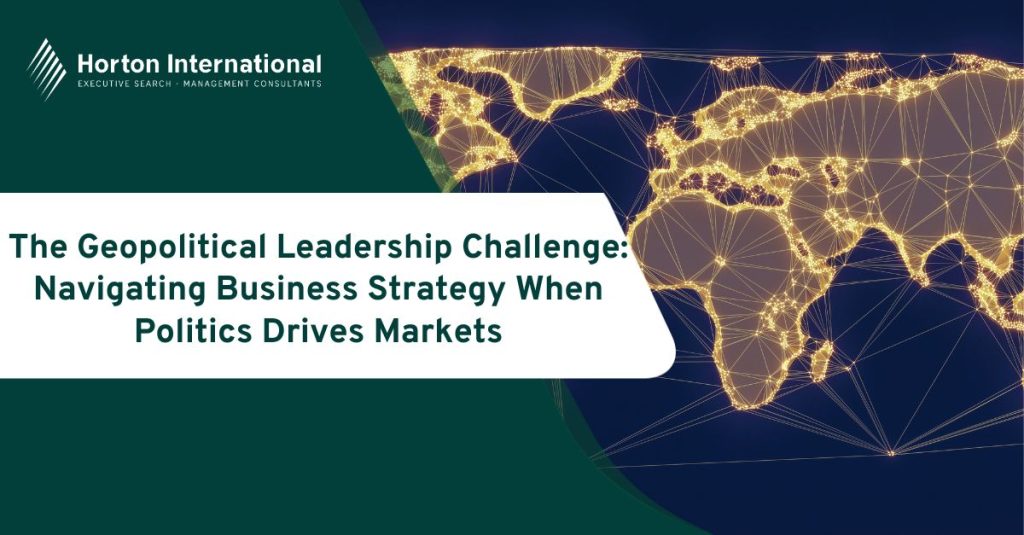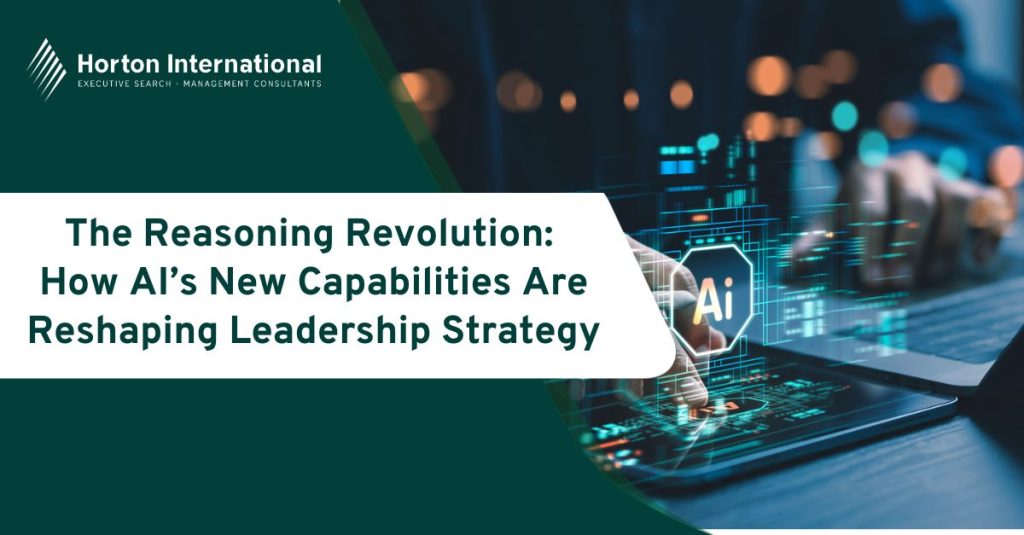Today’s boardroom conversations would have been unimaginable a decade ago. CEOs face questions that were once problems only for foreign ministers and defence strategists.
- How do we maintain global supply chains when trade routes are pawns in geopolitical chess games?
- How do we balance stakeholder capitalism with rising economic nationalism?
We’re witnessing a recalibration of global business strategy. Assumptions underpinning three decades of globalisation: that economic integration would lead to social cohesion and that political tensions would remain manageable sideshows, no longer hold in many key markets
Today’s executives face a world where trade and investment policies are no longer designed solely to foster economic growth but also serve as instruments to defend and enhance geopolitical aspirations. It is a world primarily of geopolitical, rather than economic, risk.
The New Reality: Power Politics Meets Corporate Strategy
The shift from global cooperation to economic nationalism represents more than a policy adjustment; it’s a reframing of how businesses must approach strategic planning. Economic nationalism is gaining traction over corporate social responsibility.1Governments are prioritising domestic industries and national security over multilateral cooperation – most notably in the infamous Trump tariffs.
The implications are profound and immediate:
- Leading automakers are scaling back electric vehicle expansion plans and revising long-term investment commitments.
- Six major US banks and five Canadian ones have left the Net Zero Banking Alliance, a UN-backed initiative to align financial institutions with global climate goals.
These actions represent a clear pullback from previously stated commitments.
Such choices signal a broader redefinition of corporate priorities. Politics isn’t merely creating headwinds for long-term business strategy; it’s deepening the misalignment between market realities and the political risk management that have guided executive decision-making for generations.
Consider the examples unfolding at the highest levels of governance worldwide. Senior officials increasingly frame economic nationalism not just as government policy, but as a civic responsibility. The emphasis on consuming domestically produced goods and supporting local industries represents more than protectionist rhetoric; it signals a fundamental shift in how major economies view their relationship with global markets. Leaders assert that continued preference for imported goods creates avoidable economic vulnerabilities, illustrating how economic nationalism is being elevated to a moral imperative across diverse political systems.
Strategic Autonomy in a Multipolar World
The challenge facing today’s leaders is not simply managing increased political risk – it’s recognising that the entire framework for international business is being rewritten. Strategic autonomy is now the watchword for nations seeking to reduce dependencies that could become vulnerabilities – recent concerns about China’s domination of the rare metals market for example. For business leaders, this means traditional approaches to supply chain optimisation, market entry strategies, and stakeholder engagement require rapid and fundamental reassessment.
Building resilient strategies when globalisation assumptions no longer hold demands a sophisticated understanding of how geopolitical tensions translate into operational realities. Leaders need new frameworks that handle rapid shifts in regulatory environments, sudden changes in trade relationships (tariffs again), and the emergence of forms of economic competition combining commercial and security considerations.
Successful organisations will be those that view these challenges not as constraints but as opportunities to build competitive advantages through enhanced resilience. Easy to say, harder to do.
The Leadership Imperative: Practical Frameworks for Uncertain Times
Effective geopolitical leadership in this environment requires several key capabilities:
- Enhanced political risk assessment: Traditional country risk models must evolve to incorporate the speed and unpredictability of modern political changes, including the cascading effects of domestic political developments on international business environments
- Stakeholder engagement across political divides: Leaders must develop the diplomatic skills to maintain cross-border leadership with diverse political constituencies whilst avoiding entanglement in partisan divisions
- Supply chain resilience without protectionism: Building robust supply networks that can withstand geopolitical shocks whilst maintaining the efficiency gains that drive competitiveness2
- Cultural intelligence in fragmented markets: Understanding how rising nationalism, even parochialism, may consumer behaviour and regulatory expectations
- Long-term planning in short-term political cycles: Developing strategies that can adapt to political volatility whilst maintaining coherent long-term direction
This is not likely to be a temporary disruption to be endured, but a permanent shift requiring new leadership competencies. The leaders who will thrive will balance the demands of multiple stakeholders: shareholders, employees, customers, and increasingly assertive governments, whilst maintaining business coherence.
Building Competitive Advantage Through Uncertainty
Paradoxically, geopolitical uncertainty creates opportunities for organisations with the leadership capability to navigate complexity. Companies that can demonstrate genuine resilience, authentic stakeholder engagement, and adaptive strategic planning will differentiate themselves in markets where many competitors are paralysed by uncertainty or plagued by poor or indifferent comms.
Such comms demand leaders who communicate effectively with anxious stakeholders whilst delivering demonstrable returns on investment. The ability to translate geopolitical complexity into clear strategic choices, and to execute those choices consistently despite external turbulence, has become a core leadership competency.
Immediate Actions for Geopolitical Leadership
The organisations that emerge stronger from this period will be those that understand geopolitical leadership is not about predicting the future but about building capabilities that can adapt to multiple possible futures. More importantly, they will have taken concrete steps to prepare their organisations for this new reality. Steps like these:
- Geopolitical audits: systematically review your organisation’s exposure across three dimensions – supply chain dependencies, regulatory vulnerabilities, and market concentrations. Map these against current geopolitical tensions and identify your top five risk scenarios. This isn’t an academic exercise; it’s operational intelligence that should inform immediate strategic decisions.
- Establish geopolitical intelligence capabilities: Most organisations lack the internal capacity to interpret political developments through a business lens. Consider whether this requires hiring specialists, engaging external advisors, or partnering with organisations that can provide real-time political risk analysis. The investment in geopolitical literacy pays for itself in strategic timing and risk mitigation.
- Develop stakeholder mapping beyond traditional categories: The stakeholder universe now includes government officials, regulatory bodies, and political influencers who can significantly impact your operating environment. Create systematic engagement plans that build relationships before you need them, particularly with officials responsible for trade, industry regulation, and foreign investment policy.
- Test your strategic communications for political sensitivity: Review your corporate messaging, sustainability commitments, and stakeholder communications through a geopolitical lens. What sounds like responsible corporate citizenship in one market may be perceived as political positioning in another. Develop market-specific communication strategies that acknowledge local political sensitivities without compromising core values.
- Build scenario planning into quarterly strategic reviews: Rather than annual strategic planning, embed geopolitical scenario planning into regular business reviews. Develop three scenarios for each major market: optimistic, pessimistic, and disruptive – and test your operational plans against each. This creates organisational ‘muscle memory’ for rapid response to trade disruption.
Those who can master this new form of strategic leadership, where success depends as much on understanding power politics as it does on understanding markets, and who are prepared to act on that understanding immediately, will be the once who lead companies into this less certain future.
Source
[1] https://sustainabilitymag.com/articles/bcg-asks-has-sustainability-become-unsustainable-in-202is
[2] https://www.ft.com/content/47b334a9-69eb-4cd0-af22-6ad0b92c0ef6/







